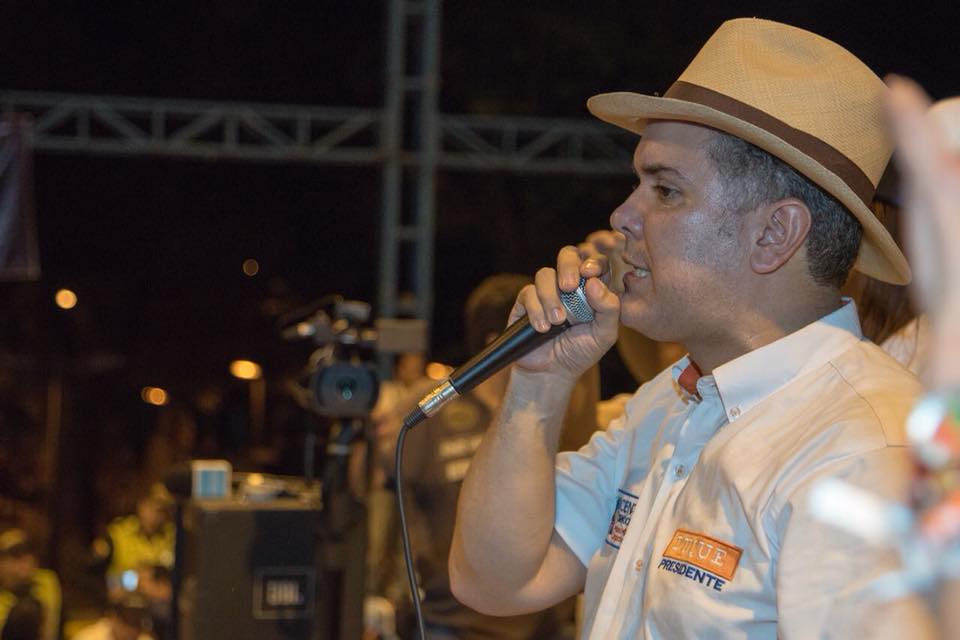Ingresa o regístrate acá para seguir este blog.
There is very often a significant difference between what one might like to see happen and what actually does transpire.
In this regard, in relation to our previous post, lest there be any confusion, we don’t expect Humberto de la Calle to be Colombia’s next president. As much as we may like what he’s about, the majority of the Colombian electorate, those who actually matter in this, don’t. Or at least they don’t want him as their next president.

Iván Duque: The ‘right’ fit for Colombia (photo from Facebook).
In fact, de la Calle himself more than likely realises he won’t be taking up residence at Palacio de Nariño.
Okey-Duque
The man who will be doing that, barring what would amount to a significant sea change in the state of play, is Iván Duque.
It’s pretty clear why.
Firstly, in ‘normal’ circumstances, those who bother to vote in Colombia look to the centre/centre-right when electing their president.
Taking that as a given, there are really only two other ‘serious’ challengers to Duque: Sergio Fajardo and German Vargas Lleras.
Yet, if we are to trust the majority of opinion polls, the country’s left, or more socially-democratic minded we could say, are behind Gustavo Petro in significant numbers. For many in this bracket, it’s Petro or nothing (or certainly not Álvaro Uribe’s protégé Duque). So this large minority, if they get out and vote, should do enough to get their ‘messiah’ into the decisive second-round vote.
The thing is, faced with a split centre-right vote, the Petro ticket does well.
Petro bomb
However, in a straight shoot-out against just one, let’s say more ‘acceptable’ candidate for this country, Petro’s a losing bet. This is especially so when it’s seen as a black-and-white contest, left versus right, as it will be with Duque.
It seems safe to assume that the majority of Vargas Lleras votes would transfer to Duque. Some Fajardo voters might swing to Petro, but certainly not all of them.
Thus, for the many ‘Anybody but Duque/Uribe’ Petro voters, their best chance of keeping the Centro Democrático out might be to opt for Fajardo in the first round. That is, try and make it a Duque-Fajardo head-to-head. In that scenario, some more centrist-type voters who wouldn’t contemplate siding with Petro, might be more inclined to go with Fajardo rather than Duque.
Of course, this sort of tactical, second-guessing voting largely based on opinion polls is risky. It could all backfire.
Nonetheless, regardless of how the others line up, this looks to be Duque’s contest to lose.
The right way
This brings us on to the broader issue of why Colombia tends to shun anybody with a hint of ‘left’ to him/her when it comes to its president.
The fact that the state has been battling leftist insurgents since the 1950s is a significant factor. For this particular election, the murderous activities of Farc dissidents on the Ecuadorian border, the controversial arrest of a high-up ex Farc guerrilla on drug trafficking charges and the stop-start peace talks with a still active ELN reinforce the commonly-held view that ‘left is bad’. The political and social turmoil in neighbouring ‘socialist’ Venezuela is also playing its part.
Yet other Latin American countries have had to deal with a violent left without this resulting in such political thinking being pretty much dismissed outright.
One of the differences for Colombia is due to the fact that the state, with significant help from right-wing paramilitaries, systematically destroyed the political left, rendering it no more than an irritant. The discourse has been dominated by the victors, the rightist state and its media friends.
Those on the left are subversives, a threat to the Colombian republic. So the narrative goes anyway. (It is important to note here that the United Nations estimates that the Farc and ELN accounted for 12 per cent of civilian deaths in the conflict up to 2016, with 80 per cent attributed to right-wing paramilitaries. The government was responsible for the remaining eight per cent.)
Thus, with the recent violent events mentioned above, Colombia’s rightist guardians look as appealing as ever to urban dwellers across the stratum divide.
Now is not the time to rock the boat. Better the devil you know guys.
_______________________________________________________________________
Facebook: Wrong Way Corrigan – The Blog & IQuiz “The Bogotá Pub Quiz”.




no creo que tenga mucho qué ver si con izquierda o derecha, tiene qué ver más con populismo y con reconocer ciertas actitudes. en dónde se han reconocido actitudes como ésta: proponerse como el salvador, donde no importa la propuesta sino que sea él quien la propuso, condenar a la oposición y decir que son o terroristas o traidores (o ladrones), aludir a odios y envidias y decir lo que la gente quiere oír y que esa persona va arreglar todo y es ‘la solución’, prometer cosas sin base lógica e ireales, decir que todo lo de los demás está mal etc. vienen a la cabeza cosas como lo de chávez y maduro,pero también de trump. y todas esas cosas las está haciendo petro, y con su actitude laxa hacia los ladrones de transmilenio, los que ocupan espacio público, los que tiran piedra en las protestas y demás también se ven actitudes como que a los seguidores se les da carta bñanca para delinquir, pero los de la oposición son criminales y el crimen es ser opositores. eso también se ha visto con maduro y con trump, y trump no es de izquierda, pero sí es un narciso populista
- Me gusta
0
- No me gusta
0
ReportarCalifica:
Sí, de hecho, no soy un gran hincha de las etiquetas políticas. Para ser de ‘la derecha’ en Irlanda significa algo completamente diferente acá en Colombia por ejemplo. Estamos hablando de populismo en cualquier forma.
Y el gran problema con populismo es que tenemos políticas sin muchas valores. Pero el pueblo tiene culpabilidad también. Quiere todo ya, no piensa en el largo plazo.
- Me gusta
0
- No me gusta
0
ReportarCalifica: